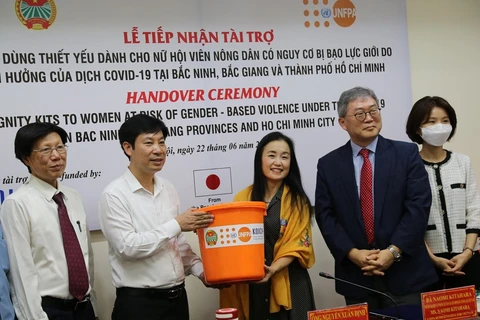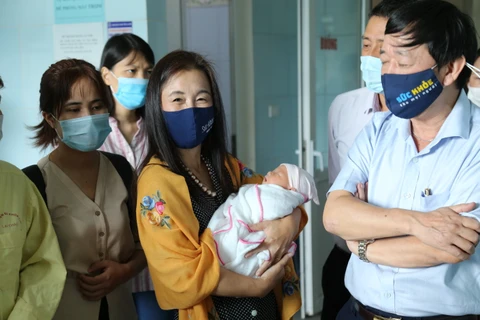Hanoi (VNA) - During the COVID-19 pandemic, disruptions in the delivery of sexual and reproductive health services are exacerbated when they are considered non-essential.
In the second year the pandemic havocs the world, several countries are recovering from recessions caused by the crisis, while other countries are still struggling in the fight against COVID-19 as they face difficulties in access to vaccines.
This year, on the occasion of World Population Day on July 11, the United Nations Population Fund (UNFPA) makes a global appeal on giving priority to sexual and reproductive health and the rights for all through access to information and services in the face of changes in fertility and demographic shifts.
Priority given to reproductive health
According to an assessment by the UNFPA in Vietnam, the pandemic has crippled the healthcare system, especially in sexual and reproductive health. On the one hand, those who can gain access to sexual and reproductive health care delay childbearing in times of fiscal uncertainty or crisis. On the other hand, disruptions in the supply of contraceptives coupled with lockdowns are predicted to result in a sharp rise in unplanned pregnancies for the most vulnerable populations.
A UNFPA study, conducted in March, found that an estimated 12 million women experienced disruptions in access to family planning services.
UNFPA Representative in Vietnam Naomi Kitahara said that the pandemic also exposed and exacerbated gender-based inequalities in the world: gender-based violence increased under lockdown, as did the risk of child marriage and harmful practices against women and girls. Significant numbers of women left the labour force - their often low-paying jobs were eliminated or caregiving responsibilities for children learning remotely or for homebound older people increased -destabilising their finances, not just for now but in the long run.
In this context, many countries have expressed increasing concern about changes in fertility rates. In the past, warnings related to fertility rates have led to human rights violations.
According to the UNFPA in Vietnam, whether it is a boom or a decline in the population, it is important to prioritise reproductive health and reproductive rights for all.
Promoting pre-marriage health check-ups
In population work, the COVID-19 pandemic has also crippled the global healthcare system and Vietnam does not lie outside the vortex.
In order to improve the quality of the population, despite impacts of the COVID-19 pandemic, Vietnam is making constant efforts, together with international organizations, to maintain reproductive healthcare activities, especially for women and adolescents.
Vietnam is currently home to more than 96.5 million people, ranking 3rd in Southeast Asia and 15th in the world in the population size. The population growth rate has been successfully controlled, with the population growth rate of 1.05-1.15 percent in the past 10 years (2009-2019) and the replacement fertility rate maintained for 14 years.
In 2007, Vietnam entered the golden population period, with the population structure changing positively, and the working-age population increasing sharply, accounting for 68 percent. The population quality has improved in many aspects, and the average life expectancy has increased rapidly, reaching 73.6 years in 2019, higher than many countries with the same per capita income.
The 12th Party Central Committee’s resolution on population work in the new situation emphasized the need to focus all resources on shifting population policy from family planning to population and development.
Therefore, population work does not focus only on family planning as before. It now needs to be associated with the goals of socio-economic development, national defence and security - factors that are related to rapid and sustainable socio-economic development to raise the status of Vietnamese people.
Over the past years, in order to contribute to improving the population quality, the General Department of Population and Family Planning under the Ministry of Health has carried out many projects and programmes such as providing pre-marriage health check-ups and consultation, prenatal and neonatal screening, stepping up communications to reduce consanguine marriage, unplanned pregnancy, abortion among adolescents and young adults, and mental health care for the elderly.
Many prenatal and newborn screening programmes have been implemented in all 63 provinces and cities with more than 10,000 districts and communes.
In addition, pre-marriage consultancy and health check-ups have been also carried out in 63 localities, contributing to raising public awareness and reducing child marriage and consanguine marriage, especially in ethnic minority-inhabited areas.
Vietnam’s Population Strategy until 2030, approved by the Prime Minister, aims at firmly maintaining replacement fertility, bringing the sex ratio at birth to the natural balance, taking advantage of the golden population structure, adapting to the aging population, rationally distributing the population and improving the quality of the population so as to contribute to the rapid and sustainable national development./.

Nearly 5,100 UNFPA dignity kits sent to women in pandemic-hit localities
Close to 5,100 Dignity Kits sponsored by the United Nations Population Fund (UNFPA) have been delivering to women and girls at risk of gender-based violence as a result of the COVID-19 in the three pandemic-hit areas of Bac Giang, Bac Ninh provinces, and Ho Chi Minh City.






















